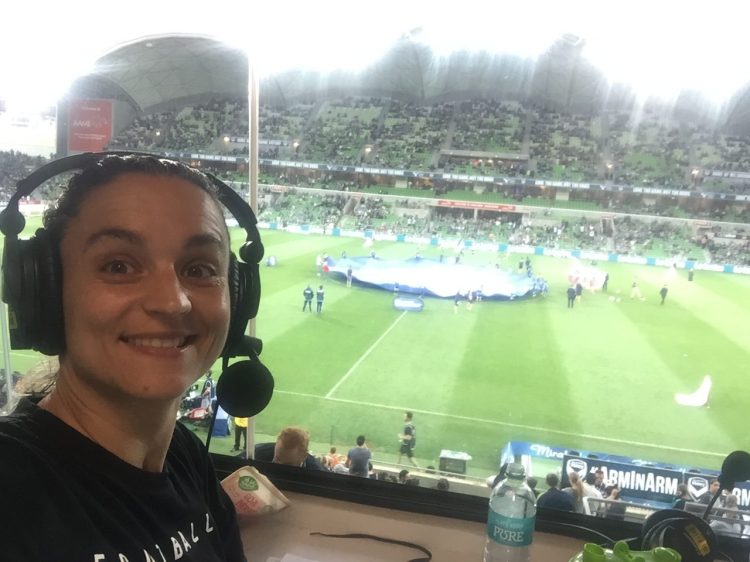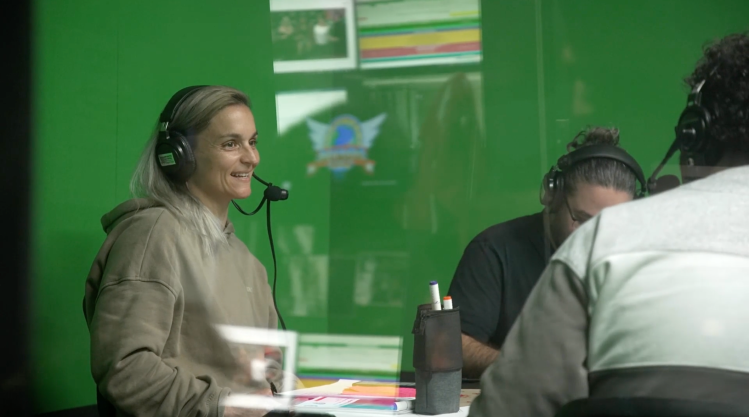In November, 2021, Melissa Barbieri’s column for KEEPUP detailed the veteran goalkeeper’s plans to “break down barriers” to pursue her passions – which includes becoming a female lead commentator.
Fast-forward one year, and Barbieri is the star of this week’s episode of A-Leagues All Access: Don’t Look Back. The episode details Barbieri’s passion for broadcast; it’s a flame which still burns brightly as the Melbourne City goalkeeper heads into her 26th season as a professional footballer.
I was always told I couldn’t do things because I was a girl. Things like ride a motorbike or play football.
As I got older there were different barriers, such as not having women’s leagues to compete in at junior and senior level – the A-League Women’s competition didn’t start until I was 28 – and I couldn’t go overseas.
I’ve become used to breaking down barriers because that’s what I had to do to pursue the game I love, including being the first female to play in the men’s state league. Now I’m ready to take down another obstacle – I want to become a female lead commentator.
There was a voice that made me fall in love with the game. I lost count of how many times I watched G’ole, the official documentary film of the 1982 World Cup. That voice was Sean Connery.
The great moments of football always have a voice attached. Martin Tyler was a constant throughout my junior and senior career, a voice who incidentally is still going.
I’m not saying I’m Sean Connery or Martin Tyler, but I have a feeling I can make an impact with the microphone for future generations and maybe make people fall in love with the game.
I haven’t retired yet but I’m effectively killing two birds with one stone – commentating whilst playing. A coach of mine actually picked up on it, asking me why I wasn’t screaming like usual.
At the moment, it’s just reserved for when the ball is at the other end, and not when opposition strikers are firing at my goal.
People keep asking me why I don’t retire. I certainly don’t want to overstay my welcome. While uncertainty around my next career step was a factor, opportunities keep presenting themselves because clubs are also reluctant to spend one of their few visa spots on goalkeepers.
I got my first taste of life on media street after we won the 2010 Asian Cup. I told Football Australia staff I wanted to do media, and did a series of appearances, including Hey Hey It’s Saturday. I loved it.
I had dabbled in expert comments before, but I got my real break in commentary in 2012, with Fox Sports, doing expert comments for A-League Men at the tail-end of the season. I called a game at AAMI Park, I felt confident and did well. I got a call back for the following week and it was not the same fairy tale experience.

I wasn’t feeling particularly good in the lead up and watching the first half but thought I could push through. I couldn’t….during the second half I had to ditch my headshot and race to the first aid room for help. I started vomiting and had a fever. I was working whilst recovering from ankle surgery and the stitches had become infected, to the degree I was at risk of getting sepsis. But I never got called back.
My time in my early career with the legendary Peter Wilkins was always memorable. It was great fun and I learnt the importance of research, knowing each player and what they did outside the game. He’d say, “The viewers love it, try and tell a story”. He had a poster full of information about each player and what they did outside of football. The time spent on it was monumental.
I then used the year off while to pregnant to work with the ABC in 2012/13 in the role of expert comments. My experience with expert comments for the 2016 Rio Olympic Qualifiers was also a highlight. Learning from Brenton Speed the amount of preparation for pronouncing names that are not in your native language was really eye opening.
Others, like Simon Hill and Steph Brantz, have taught me so much without knowing.
Relating the tactics and the on-field narrative are what really drive me. I’m an A-Licensed coach and I love helping shape players. But the cut throat nature of the game is such that I feel even being a coach isn’t an assured career path. You can be fired at the drop of a hat because the team lost three in a row or because you asked about equality for the female team. It takes decades to build a kind of resilience to those emotions.
In the media landscape, so many great women are making a name for themselves in the writing space and photography. But in terms of commentary, we don’t have any prominent names calling games beyond Steph Brantz here in Australia.

In the UK, there are plenty of women who are doing a great job. The Tokyo Olympics was a great way to listen to female callers and drove me to keep giving this a go. Watching the coverage of the FAWSL in England has also been hugely inspiring. I love seeing my old teammate, Alicia Ferguson, not only be a great pundit but also a producer herself. I find these women hugely motivational. I would love to be able to add my name to the list of women calling games in both the male and female games.
Streaming has made the game more accessible, so you can practice as much as you like, in the comfort of your own home. A great way to start without the nerve racking feeling of an audience. Hopefully the plan is to start calling NPL Victoria games in the flesh, once the nerves have allowed me to make mistakes without the feeling of capitulation.
(KEEPUP’s) James Dodd has helped me in this early phase. He gave me that idea of calling games whilst playing, it was a fun way to get comfortable with vocabulary, vocal tones and building excitement. But only when the ball is at the opposite end and when the scoreline is well and truly locked in.
I know it will be a long road, but I’m determined to pursue this commentary path.
This decision has made me reflect on what made me fall in love with football – things like the 1982 World Cup, or watching my brothers Roger and Adrian training at Bulleen Veneto Juniors. The Veneto Club was home to some great teams back in the ’80’s and ‘90s with former Socceroos keeper Jeff Olver, Frank Valentic, battling it out against keepers like Maurice Rapone.
This was all before I found out that women were actually playing and I found new heroes like Jane Oakley and Julie Murray to look up to. Heroes matter. Now the current Matildas, who are full time professional footballers, are motivating a new generation where the opportunities are endless.
Maybe I can be the voice behind the journey of these new stars. The overlay that catapults them to their dreams of being a professional footballer.
Maybe it’s the start of a new magical journey.
Melissa Barbieri played 86 times for Australia, going to four World Cups, one Olympic Games and three Asian Cups – lifting the Asian Cup trophy as Matildas captain in 2010.
Produced by KEEPUP Studios and JAMTV, each new episode of the docuseries will debut on Thursday at 7:30pm AEDT on 10 Play, KEEPUP.COM.AU, the KEEPUP app and KEEPUP on YouTube. It will be available on Australia’s fastest growing streaming service, Paramount+, and will then be broadcast on 10 Bold at 2:00pm AEDT on Saturday afternoons as an appetiser for the evening’s Isuzu UTE A-League Men game on the same channel.





